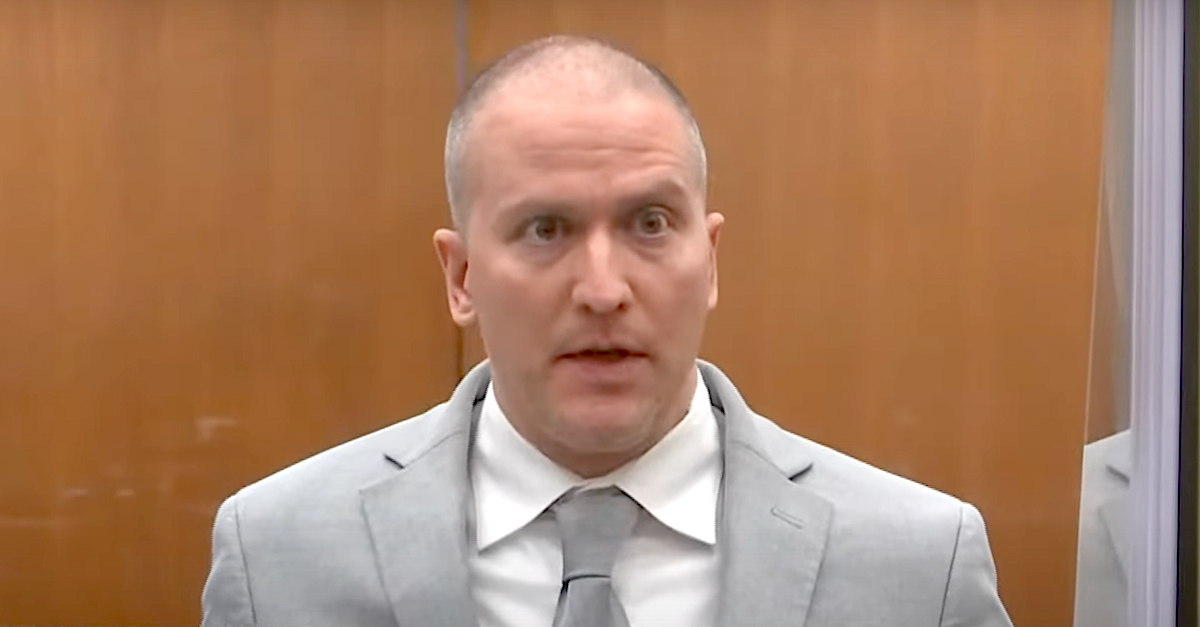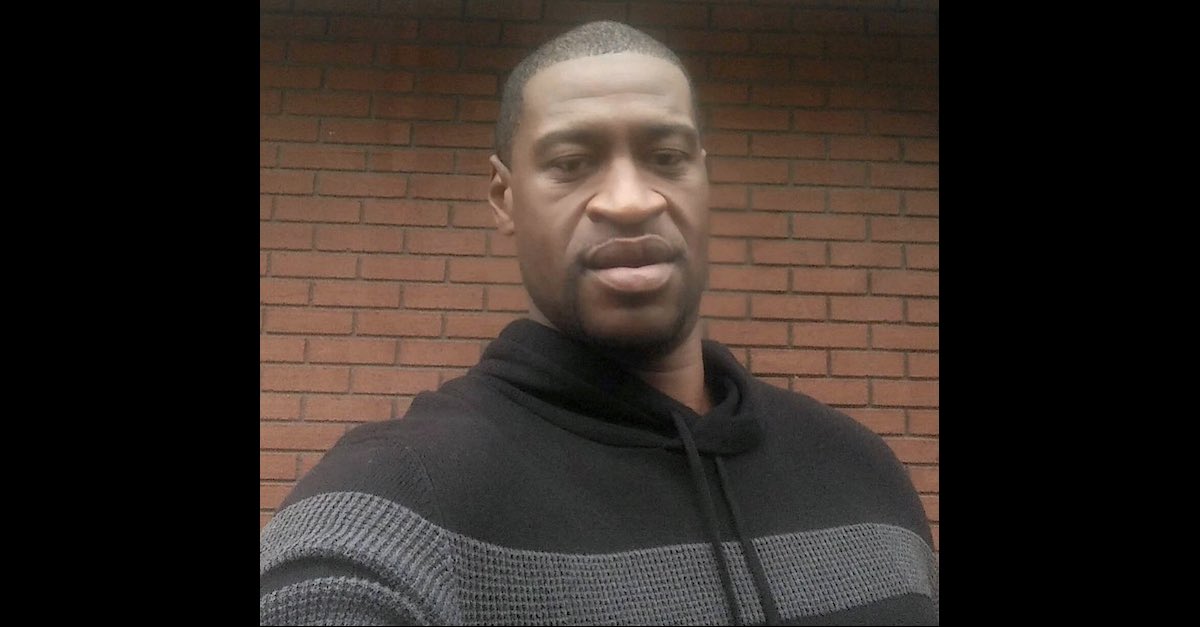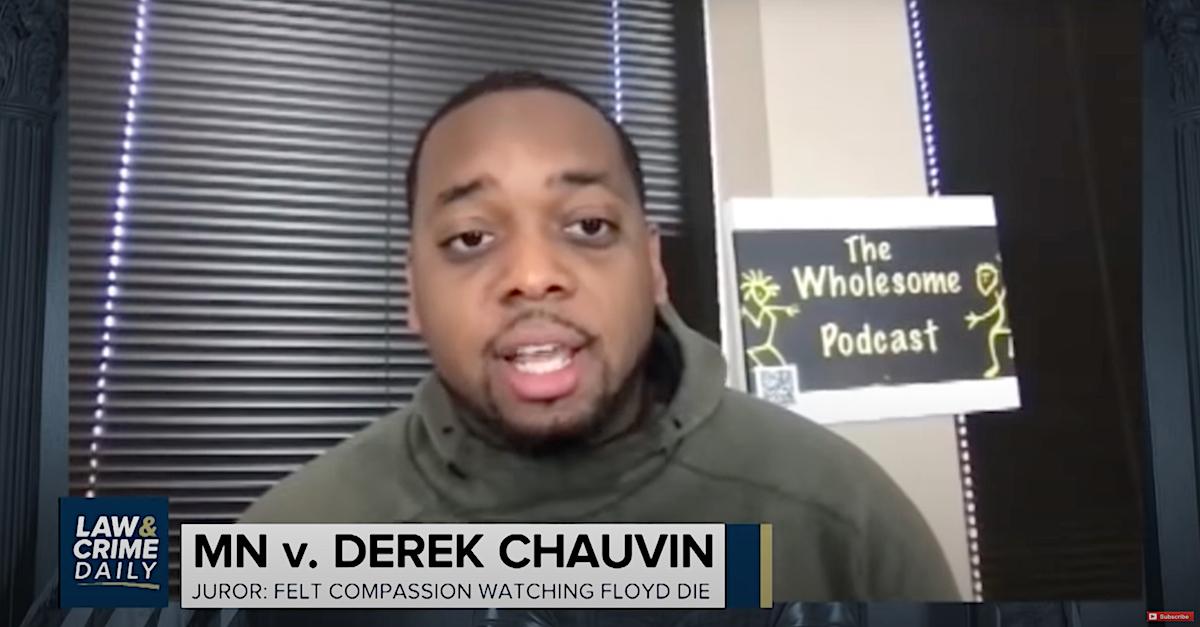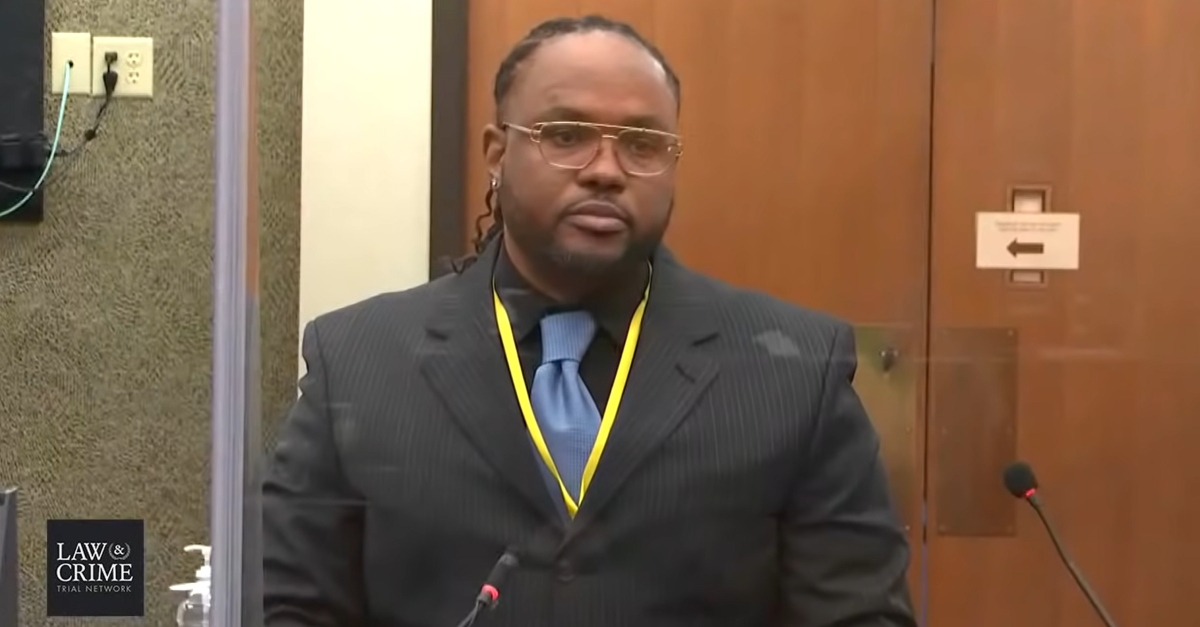
Derek Chauvin appeared at a June 25, 2021 sentencing hearing in a Minnesota state district court. (Image via the Law&Crime Network.)
The former Minneapolis police officer convicted of murdering George Floyd Jr. is underscoring a request for an appeals court to overturn his multiple state-level convictions.
A Minnesota jury agreed with prosecutors last year that Derek Chauvin was guilty of second-degree murder, third-degree murder, and second-degree manslaughter. Chauvin struck a plea deal on federal charges in separate proceedings.
Chauvin’s attorneys on Friday filed a reply brief to elucidate several potential rationale for overturning the ex-cop’s state-level convictions. The defense’s laundry list of complaints includes the attention attracted by the death of Floyd and issues with a juror the defense characterized as a liar.
“Pretrial publicity coupled with threats of violence poisoned the jury against Appellant Derek Chauvin,” the brief argues. It cites “local daily media coverage,” “protests at the courthouse,” and “riots in response to the events in question” — the latter of which it said were “the second-most destructive riots in American history that caused $500,000,000 in property damage and two deaths in the local Hennepin County area.”

George Floyd. (Image via Attorney Ben Cump.)
The brief contains several technical legal arguments, including that the district court “erred on each tier” of a U.S. Supreme Court test for measuring whether pretrial publicity and preconceived juror notions necessitated a change in venue.
“[P]rejudice is presumed when the community from which jurors are drawn is sufficiently poisoned either by adverse publicity or the effects of the very events at issue – in this case the second worst riots in U.S. history,” the brief states. “Presumed prejudice requires changing venue because voir dire cannot perform its usual function of securing a fair and impartial jury.”
Chauvin’s jurors said the state “suggests ignoring and abandoning the U.S. Supreme Court’s two-tiered approach” to such questions and “to apply abuse of discretion analysis to both tiers” instead.
“With the biased media coverage, the Floyd riots, the Brooklyn Center riots during the trial, the lack of cooling period, and legally-impossible conviction on all charged counts, Chauvin’s case lands in the company of extreme cases where publicity went beyond the bounds of mere news media and had a physical effect on the venue community such that voir dire was impotent and prejudice is presumed,” the defense brief continued.
The document went on (we’ve omitted some citations and embedded several others links rather than as text):
The media publicity was pervasive, and overwhelmingly hostile to Chauvin and police in general. The pretrial publicity was constant and overwhelming from May 25, 2020 through trial. The major media outlets in the Twin Cities had coverage regarding the case literally every day from May 26, 2020 until trial concluded. The coverage glorified Floyd and demonized Chauvin. The Minneapolis Police Chief and Minnesota’s head of the Department of Public Safety called the incident a murder (a legal conclusion) on June 4, 2020 in conjunction with announcing the firing of Chauvin. Pretrial publicity of the firing of a police officer on the heels of an event giving rise to criminal charges is a significant factor in finding that prejudice is presumed. Numerous news stories detailed that Chauvin falsely had his knee on Floyd’s neck thereby choking Floyd. Black Lives Matter began a campaign based on the slogans “get your knee off our neck” and “I can’t breathe” all suggesting that Chauvin caused Floyd’s death by cutting off the airway in his neck and causing Floyd to suffocate. This was not simply pretrial publicity regarding the facts of the case — the pretrial publicity held up Chauvin as the symbol of police brutality.
The brief also complained that jurors were not sequestered and that one juror — Brandon Mitchell, who has spoken publicly several times about his service — “lied regarding his views of the case and the extent of his activism.”

Brandon Mitchell spoke to the Law&Crime Network shortly after convicting Derek Chauvin.
The brief explains Chauvin’s issues with Mitchell (again, we’ve omitted the strict legal citations to the record):
Mitchell had traveled 1,000 miles to participate in an August 28, 2020 protest march in Washington D.C. That march used the slogan “Get Your Knees Off Our Necks” in direct reference to Chauvin and George Floyd. At that march, Mitchell wore a t-shirt with a photo of Dr. Martin Luther King, Jr. and words saying “BLM * Get Your Knee Off Our Necks.” Had this come to light at voir dire, it would have allowed Chauvin to evaluate whether to strike Mitchell for-cause.
Specifically, the brief pointed out the following:
In his juror questionnaire, Mitchell was asked “Did you, or someone close to you, participate in any of the demonstrations or marches against police brutality that took place in Minneapolis after George Floyd’s death?” Mitchell checked “No.” In isolation, this answer to the question specifically about Minneapolis could have been candid, but this question did not stand alone. Two pages later, Mitchell was asked: “Have you, or someone close to you, ever helped support or advocated in favor of or against police reform.” Mitchell checked “No.” Here, Mitchell lied. The march Mitchell had traveled 1,000 miles from home mere months before had this as the first paragraph on its registration page: “Instigated from the protest movement that has risen up since the police killing of George Floyd, the ‘Get Off Our Necks’ Commitment March on Washington will be a day of action that will demonstrate our commitment to fighting for policing and criminal justice.”
That same evidence about the purpose of the march shows Mitchell was lying when asked: “have you, or anyone close to you, participated in protests about police use of force or police brutality.” Mitchell checked “No.” Mitchell answered “No” to the question “Is there anything else the judge and attorneys should know about you in relation to serving on this jury.”
The brief argues that Chauvin would have sought to strike Mitchell from the venire “for cause” had those questions been answered in a different fashion; it also says the judge who oversaw the trial rubbished “without analysis” the defendant’s concerns about the matter once it was discovered.
Prosecutors have in the past defended the juror in question. They have also said the publicity surrounding the trial wasn’t as significant as they initially feared.
Additionally, Chauvin’s reply brief balks that his third-degree murder conviction was legally illogical because his “actions were directed against an individual person.”
“Third-degree murder is only possible with an undirected mens rea,” the brief says, citing the Minnesota Supreme Court’s 2021 ruling in favor of Mohammed Noor, another convicted police officer. Chauvin’s April 20, 2021 conviction predated the high court’s Sept. 15, 2021 ruling in Noor’s case, and Chauvin’s attorneys want the holding in Noor’s case applied to Chauvin.
Plus, according to Chauvin, his second-degree felony murder conviction must be reversed because police officers cannot as a matter of law be convicted of felony murder attached to a third-degree assault.
Again, from the brief (and, again, some citations are omitted):
As a police officer, Chauvin was statutorily authorized to commit “assaults” to effect an arrest under Minn. Stat. §629.33.
[ . . . ]
Because police officers are duty bound to “assault” suspects resisting arrest, Minnesota’s assault statute becomes a strict liability statute for a police officer because the officer always “intends” to physically touch the suspect, if it is later found that the touch crossed the line of “reasonableness.” Thus, Chauvin was convicted under a strict liability standard because the State was not required to prove any intent — i.e., the State was not required to prove Chauvin intended to inflict bodily injury on Floyd. Strict liability offenses are disfavored and the legislative intent to impose strict liability must be clear. Courts must apply the rule of lenity in construing any penal statute. Applying lenity would require the State prove Chauvin intended to inflict “substantial bodily injury” on Floyd when Chauvin placed his knees on Floyd’s back to restrain Floyd. Because the jury was not instructed that regarding Chauvin’s “intent” to inflict bodily injury on Floyd, Chauvin’s conviction must be reversed.
Based on these standards, Chauvin cannot be convicted of felony-murder because he was authorized to arrest Floyd and therefore “touch” Floyd when Floyd resisted arrest. Because State v. Dorn held the intent necessary to commit an assault is the intent to “touch,” and police officers must always “touch” suspects who resist arrest, the State has converted the second-degree murder statute into a strict liability offense where the underlying offense is an assault. Thus, the State did not have to prove any “intent” with respect to Chauvin other than the intent to “touch” Floyd which Chauvin was authorized and duty bound as a police officer to do.
The brief went on to argue that the district court improperly withheld training manuals that instructed Minneapolis police officers to place their knees “on the back of suspects resisting arrest.”
The filing also asserted that Chauvin’s trial violated the Constitution by failing to allow testimony that Morries Hall, a passenger in Floyd’s vehicle, believed Floyd “was under the influence of drugs at the time of his death.”
Hall did not testify during Floyd’s trial because he said he would incriminate himself if he took the stand. Chauvin’s attorneys say Hall’s beliefs could have been entered in other ways had the court declared him an unavailable witness.

Morries Hall. (Image via the Law&Crime Network.)
Additional arguments are also contained in Chauvin’s 34-page reply brief. The document as a whole asks either (1) that Chauvin’s convictions be reversed, or (2) that Chauvin receive a new trial, or (3) that Chauvin be resentenced to a lesser term.
The State of Minnesota filed previous papers to argue the opposite. Law&Crime reported at length on the state’s assertions when they were filed on Sept. 7, 2022.
“[T]he law authorizes officers only to use reasonable force,” the state argued as to Chauvin’s claims that sworn police officers could not be convicted of certain crimes, such as assault. “When officers use unreasonable force, the law holds them responsible.”
Chauvin’s reply brief, in full, is embedded below:
Have a tip we should know? [email protected]